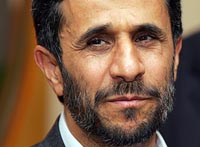Ahmadinejad visits Armenia

As Iranian-Armenian economic and political ties are supported by both sides, Iranian President Mahmoud Ahmadinejad arrived Monday on his first official visit to the neighboring country.
During the two-day visit, Ahmadinejad was to meet with Armenian President Robert Kocharian, address parliament and speak with professors and students at Armenian State University.
The Iranian leader also was to step into the controversy over the World War I-era killing of Armenians by Ottoman Turks by laying a wreath Tuesday at the memorial complex commemorating the victims.
Scholars view the killing of 1.5 million Armenians, who are Christians, as the first genocide of the 20th century. But an attempt in the United States to recognize the killings as genocide has angered Turkey, which says the toll has been inflated and that those killed were victims of civil war and unrest.
Ahmadinejad has caused outrage by suggesting that the Holocaust is a "myth" invented by Jews. An estimated 6 million Jews were killed in what most consider to be the worst genocide of the 20th century.
Kocharian was Ahmadinejad's guest last year in Tehran, and in March the two presidents formally opened the first Armenian section of a natural gas pipeline between the two countries. The ceremony was held near the Armenian town of Meghri, just over the border from Iran.
During Ahmadinejad's visit to Yerevan, he and Kocharian were expected to discuss plans to expand energy and transportation cooperation further.
The two sides may sign an agreement for the construction of an oil pipeline from Iran to Armenia, an Armenian official said on condition of anonymity because he was not authorized to speak publicly. Russian companies have expressed interest in building an oil refinery in Armenia.
Iran and Armenia also intend to build two hydro-electric plants on the Araks River, which forms the border between the two countries.
Earlier this month, Iran opened its borders to Armenian trucks transporting goods to Iranian ports on the Caspian Sea, a more direct route for goods destined to Central Asia or southern Russia than the alternative route through Georgia.
Iran and Armenia also plan to build a railroad linking the two countries, and the details should be hammered out by the end of the year, Deputy Transportation Minister Grant Beglarian said.
The railroad link would give landlocked Armenia an outlet to the Persian Gulf.
Armenia has looked to Iran as it struggles to overcome the economic difficulties posed by the closing of its borders with Turkey and Azerbaijan. The borders were closed in the wake of the conflict over Nagorno-Karabakh, a region of Azerbaijan occupied by Armenian and ethnic Armenian Karabakhi forces.
Subscribe to Pravda.Ru Telegram channel, Facebook, RSS!





